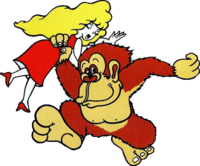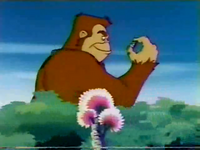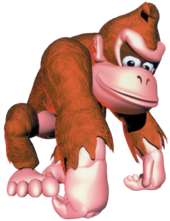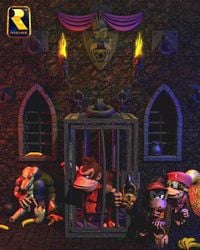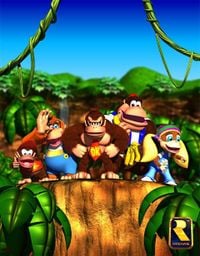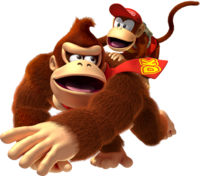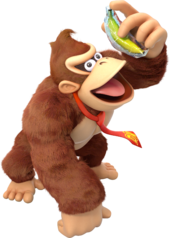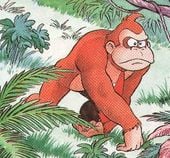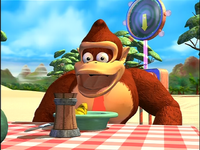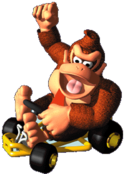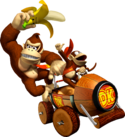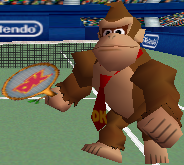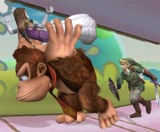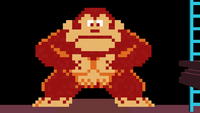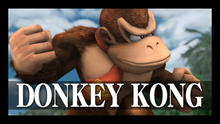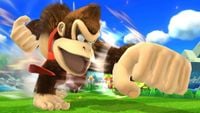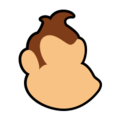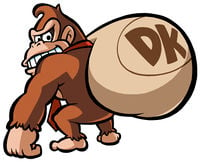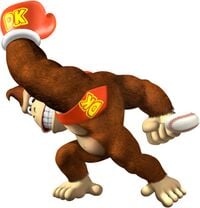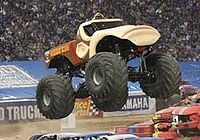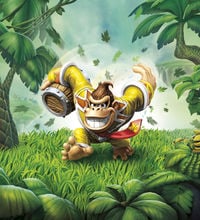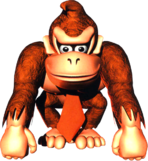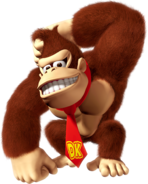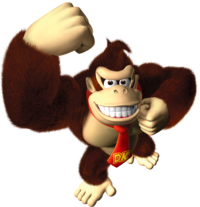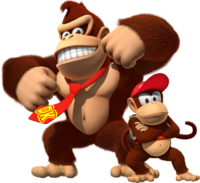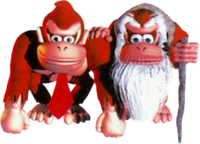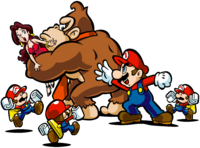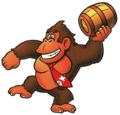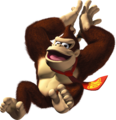Donkey Kong: Difference between revisions
MarioLover54 (talk | contribs) (Kongs appear to be several species of monkey and/or ape) |
Waluigi Time (talk | contribs) (Undo revision 2690566 by MarioLover54 (talk)) Tag: Undo |
||
| Line 4: | Line 4: | ||
|image=[[File:SuperMarioParty DonkeyKong.png|250px]]<br>Artwork of Donkey Kong for ''[[Super Mario Party]]'' | |image=[[File:SuperMarioParty DonkeyKong.png|250px]]<br>Artwork of Donkey Kong for ''[[Super Mario Party]]'' | ||
|first_appearance=''[[Donkey Kong (game)|Donkey Kong]]'' ([[Cranky Kong|as the original Donkey Kong]]) ([[List of games by date#1981|1981]])<br>''[[Donkey Kong Country]]'' (as current Donkey Kong) ([[List of games by date#1994|1994]]) | |first_appearance=''[[Donkey Kong (game)|Donkey Kong]]'' ([[Cranky Kong|as the original Donkey Kong]]) ([[List of games by date#1981|1981]])<br>''[[Donkey Kong Country]]'' (as current Donkey Kong) ([[List of games by date#1994|1994]]) | ||
|species=[[Kong]] | |species=[[Kong]] | ||
|latest_appearance=''[[Super Smash Bros. Ultimate]]'' ([[List of games by date#2018|2018]]) | |latest_appearance=''[[Super Smash Bros. Ultimate]]'' ([[List of games by date#2018|2018]]) | ||
|latest_portrayal=[[Takashi Nagasako]] ([[List of games by date#2004|2004]]-present) | |latest_portrayal=[[Takashi Nagasako]] ([[List of games by date#2004|2004]]-present) | ||
Revision as of 15:43, June 16, 2019
It has been requested that this article be rewritten. Reason: Bad writing (tagged on 18:13, 26 July 2017 (EDT))
- This article is about the character Donkey Kong, as of Donkey Kong Country. For the 1981 arcade game, see Donkey Kong (game). For other uses of the name "Donkey Kong", see Donkey Kong (disambiguation). For other uses of the moniker "DK", see DK (disambiguation).
- “My bananas and my buddy, Diddy Kong, they are gone! The Kremlings will pay! I'll hunt them down through every corner of my island, until I have every last banana from my hoard back!”
- —Donkey Kong, Donkey Kong Country
Donkey Kong, also known simply as DK or D. Kong,[1][2] is a major character in the Mario franchise and the main protagonist of the Donkey Kong franchise. A powerful, yet carefree Kong from Donkey Kong Island, Donkey Kong spends his days collecting bananas and spending time with his friends, particularly his best friend Diddy Kong. When trouble arises, Donkey Kong jumps headfirst into the action to help his friends and protect his island. However, he has also been portrayed as a villain on multiple occasions, such as in the Mario vs. Donkey Kong series. Despite his name, Donkey Kong is the third known Kong to be named as such; his grandfather Cranky Kong was the original Donkey Kong, while his father Donkey Kong Jr. was the second.
Creation
Donkey Kong's character design was created by Shigeru Miyamoto for the Donkey Kong arcade game, in which the big ape kidnaps Mario's original girlfriend, Pauline. Miyamoto says that he chose the name "Donkey" to reflect the character's stupidity[3], while "Kong" was considered a generic term for large apes in Japan[4]. Miyamoto was informed by Nintendo of America staff that the word "donkey" is not a synonym for "idiot" in English despite what the dictionary he consulted said, but decided to ignore this particular suggestion because he liked the name "Donkey Kong"[3]. Due to a mistranslation, it was also assumed that Donkey Kong had been Mario's pet ape who had been abused, and that his abducting Pauline had been revenge for the mistreatment. However, in actuality, Miyamoto was mentioning how Donkey Kong's original design looked too frightening so they dialed it back to look more friendly and harmless like someone's pet.[citation needed]
Donkey Kong's exact role in the Mario franchise is somewhat hazy. His original appearance portrayed him as a villainous or confused ape with unequaled strength. In these games, Donkey Kong didn't wear a tie. The 1994 Game Boy Donkey Kong was the first game to feature the tie (a red tie with the letters "DK" printed in white, later changed to yellow), but otherwise Donkey Kong is the same as he was in the original.
However, with the release of Donkey Kong Country later that same year, Donkey Kong was given a new personality and a new home. Donkey Kong Country also saw the appearance of the elderly Cranky Kong, who was the original Donkey Kong from the older arcade games.
History
Background
- Main article: Baby Donkey Kong
During the current Donkey Kong's infancy, he is stolen from his treetop home by Kamek and his Toady army during their massive kidnapping spree. However, Baby DK meets the Yoshis and greatly helps them in their quest to defeat the Koopa Troop. When riding on a Yoshi's back, Baby Donkey Kong helps the Yoshis perform many special moves, such as climbing vines and charging. Baby Donkey Kong is one of the seven star children.
Donkey Kong series
Donkey Kong
Donkey Kong's first appearance (where he is later confirmed to be a younger Cranky Kong) is in the arcade game of the same name, where he is the main enemy. In the game, Donkey Kong was the pet gorilla of Mario[5][6], but he escapes and angrily carries Mario's girlfriend Lady (later renamed Pauline) to the top of a high construction site. He is pursued by Mario and attacks him by throwing Barrels and creating living Fire. He is eventually chased to the top of the construction site, where Mario causes the girders supporting him to collapse, sending him plummeting to the ground.
Donkey Kong Jr.
Donkey Kong is in need of rescue during Donkey Kong Jr. In this game, Mario actually kidnaps Donkey Kong as punishment for kidnapping Pauline and stands guard next to his cage with a whip, sending various enemies like Snapjaws and Nitpickers to attack Donkey Kong Jr. In the end, Donkey Kong Jr. defeats Mario and frees Donkey Kong.
Donkey Kong 3
In Donkey Kong 3, Donkey Kong is a main villain once again, although this time, he does not fight Mario (who had gone on to star in his own series and would not meet with Donkey Kong again until much later). In this game, Donkey Kong goes on a rampage inside a greenhouse, and a local exterminator named Stanley is called in to defeat him. Donkey Kong uses a system of ropes to lower himself to the greenhouse floor. When he reaches the floor, the game ends, and Donkey Kong is able to destroy the rest of the greenhouse. After Stanley sprays Donkey Kong with insecticide three times to keep him off of the greenhouse floor, he runs away. In the final stage, Donkey Kong is forced back and gets his head stuck in a beehive. In the arcade version, upon his head getting stuck in a beehive, he also twitches and tries to get the beehive off, only to fall to the ground, with the beehive breaking in half and revealing that Donkey Kong's face is partially swollen, with his right eye also puffy, implying he was stung by bees.
Donkey Kong (Game Boy)
Donkey Kong resumes his role as the main villain in the 1994 Game Boy rendition of Donkey Kong, where he once again abducts Pauline. However, instead of it ending at 100m, he instead manages to quickly retake Pauline and force Mario to pursue him for the rest of the game, with his son Donkey Kong Jr. aiding his father in preventing Mario from rescuing her. Donkey Kong's tactics otherwise remain virtually the same, attacking mainly by throwing a variety of objects at Mario, although there are sometimes stage hazards Donkey Kong can utilize, such as pressing a switch to make bridges appear and disappear. Ultimately, he is cornered at the Tower and falls off. However, he ends up being enlarged by several Super Mushrooms, forcing Mario to fight his newly enlarged self off by throwing barrels at his face. Donkey Kong in the ending then falls on Mario (who himself ingested a Super Mushroom provided by Pauline as thanks and turned into Super Mario). Donkey Kong then begs for help like Pauline did, with Donkey Kong Jr. then rushing to his father's aid, although the credits photograph showing Pauline, Mario, Donkey Kong, and Donkey Kong Jr. at Rocky-Valley indicates that they buried the hatchet afterward.
Game & Watch series
Donkey Kong has played different roles in select Game & Watch titles.
Donkey Kong
In the Donkey Kong game, Donkey Kong attempts to stop Mario from releasing Pauline by throwing barrels at him, and Mario has to use a hook mechanism to loosen the wires supporting Donkey Kong's platform. If four wires are removed, Donkey Kong will fall.
Donkey Kong Jr.
An offshoot of the arcade game of the same name with a similar premise, in Donkey Kong Jr., the eponymous ape must obtain four keys from a tree to unlock his father's cage.
Donkey Kong II
A direct follow-up to the previous adventure, Donkey Kong II sees Donkey Kong Jr. in a pseudo-amalgamation of the third and fourth screens of his arcade game. Donkey Kong Jr. must once again climb upwards, pushing the locks open to free his father.
Donkey Kong 3
Similar to Green House and the arcade game Donkey Kong 3, the Game & Watch game Donkey Kong 3 has Stanley protecting his plants. Donkey Kong releases bees aiming at the bugman, and Stanley's job is to spray them back at Donkey Kong.
Donkey Kong Circus
In Donkey Kong Circus, Mario watches Donkey Kong juggling pineapples while balancing on a barrel. When Donkey Kong makes a mistake, Mario laughs at his performance.
Donkey Kong Hockey
In Donkey Kong Hockey, Mario and Donkey Kong settle the score with a game of ice hockey. Player 1 is Mario, while Player 2 or the CPU is Donkey Kong. It also happens to be their first instance being in a competitive, physically athletic position.
Saturday Supercade
Donkey Kong, along with Mario and Pauline, appears in several episodes of Saturday Supercade. Here, Donkey Kong is a circus escapee and is now traveling across the country with Mario and Pauline on his tail. Donkey Kong Jr. is also featured in a few episodes. On the show, Donkey Kong Jr., along with his pal Bones, travels across the globe searching for Donkey Kong.
Captain N: The Game Master
Donkey Kong makes occasional appearances on Captain N: The Game Master. Here he is more or less a giant, bestial, monster. Oftentimes on the show, Donkey Kong is manipulated by Mother Brain and her minions to do their bidding. Donkey Kong also appears in the Captain N comics.
Nintendo Adventure Books
Donkey Kong appears in the sixth Nintendo Adventure Book, Doors to Doom, in a recreation of the original game (though Mario and Luigi are trying to reach the top to rescue Princess Peach instead of Pauline). Assuming the Mario Bros. successfully reach the top of the tower, Donkey Kong is ultimately sent plummeting out of sight when Peach jabs him in the backside with her crown.
Mario Golf series
In NES Open Tournament Golf, a gorilla looking similar to Donkey Kong appears wearing a white outfit. His role is to tell the player how much money they have and when they reach certain milestones.
Donkey Kong formally first appears as an unlockable playable character in Mario Golf for the Nintendo 64. He has a drive of 275 yards. Unique to Donkey Kong, he swings his golf club with one hand in the series.
 This section is a stub. You can help the Super Mario Wiki by expanding it.
This section is a stub. You can help the Super Mario Wiki by expanding it.
Donkey Kong Country series
It has been requested that this section be rewritten. Reason: These shouldn't be a retelling of the games' stories
Sometime after the battles between the old Donkey Kong and Mario played out, the old Donkey Kong took the name "Cranky Kong" and presumably retired. His grandson, the new Donkey Kong, forges lasting friendships with many of the other Kongs, including his eager friend Diddy Kong, Funky Kong, and his girlfriend Candy Kong. He eventually begins his reign over the island's jungle. Much of the young ape’s time is spent collecting Bananas to add to his Banana Hoard, and he lives a relatively laid back lifestyle as compared to his grandfather.
However, a band of Kremlings known as the Kremling Krew forms during this time. Their acts of violence and thievery put them at odds with Donkey Kong constantly, forcing him to guard his Banana Hoard every night.
Donkey Kong Country
In Donkey Kong Country, on a stormy night, the Kremling Krew arrives at Donkey Kong Island and steals the Banana Hoard. When Diddy Kong attempts to guard it, the Kremling soldiers trap him in a barrel. The events enrage Donkey Kong upon his return to the Hoard, and he sets out to reclaim his stash. Rescuing Diddy from his barrel prison along the way, the two of them slowly defeat the enormous Kremling forces during their travels throughout Donkey Kong Island with the aid of Candy Kong, Cranky Kong, and Funky Kong.
Eventually, Donkey Kong and Diddy Kong find King K. Rool, the leader of the Kremlings, on the Gangplank Galleon, where the Banana Hoard is apparently stored. After defeating the slightly deranged king, the Kongs reclaim the Banana Hoard and return home.
Donkey Kong Country 2: Diddy's Kong Quest
In Donkey Kong Country 2: Diddy's Kong Quest, after his previous adventure, Donkey Kong decides to rest on the beach. During the day, the Kremlings kidnap the ape, leaving their footprints, a smashed chair, and a note behind them. Donkey Kong is locked in a cage on Crocodile Isle, the latest Kremling hideout. Using Donkey Kong as a bargaining chip, Kaptain K. Rool, the new identity of King K. Rool, offers to return him in exchange for the Banana Hoard. However, instead of giving in, Diddy Kong and Dixie Kong defeat the Kremlings and duel K. Rool aboard the Flying Krock; a fight that ends with Donkey Kong breaking free of his imprisonment and literally punching K. Rool out of his airship and into the ocean, where the crazed captain is attacked by sharks. After a rematch with the vengeful Kremling captain in Krocodile Kore, Crocodile Isle sinks into the ocean afterward as Donkey Kong, Diddy Kong, and Dixie Kong watch, but Kaptain K. Rool escapes on his ship.
Donkey Kong Country 3: Dixie Kong's Double Trouble!
In Donkey Kong Country 3: Dixie Kong's Double Trouble!, Donkey Kong decides to take his friend Diddy Kong on a fishing trip in the Northern Kremisphere. While there, they are overpowered and captured by the Kremlings, who claim to now be ruled by an unusual mechanical being named KAOS. Back home, Dixie Kong grows suspicious when the Kongs do not return. She, along with her cousin Kiddy Kong, who she was babysitting at the time, set out to investigate, eventually discovering that Baron K. Roolenstein, another identity of King K. Rool, is behind the entire plot. Once Dixie defeats him, Donkey Kong and Diddy Kong are released, and are thus impressed by Dixie's heroics.
Donkey Kong 64
In Donkey Kong 64, with his plots to kidnap Donkey Kong continuously coming short, King K. Rool ditches all traces of pretense and develops a machine, the Blast-o-Matic, capable of completely destroying Donkey Kong Isle. However, due to the incompetence of his underlings, the new Crocodile Isle crashes into rocks offshore and delays the blast. Squawks the Parrot, a friend of Donkey Kong, witnesses these events and reports to Donkey Kong. Donkey Kong discovers that all 201 of his Golden Bananas are stolen and four of his friends are kidnapped: Diddy Kong, Lanky Kong, Tiny Kong, and Chunky Kong, locked behind cages throughout the island.
Donkey Kong (who is playable for the first time since Donkey Kong Country), discovers a floating isle attached to the main mechanical island. Inside, K. Lumsy, an enormous, disobedient Kremling, is locked up for not destroying the island. When DK promises to get him out of the cage, K. Lumsy jumps for joy, opening up a pathway to Jungle Japes. Once there, Donkey Kong finds Diddy Kong and frees him. Many other friendly faces are found among the Kremling armies, including Funky Kong, Cranky Kong, Snide, Troff, and Scoff. In a later area, Candy Kong also joins the fight. One of her gifts to Donkey Kong is a set of Bongos, which affects Donkey Kong's later life.
As Donkey Kong frees his buddies, they in turn help him find his Golden Bananas and the keys to K. Lumsy’s cage. Eventually, the team is able to take on K. Rool in a boxing match.
Like all of the playable Kongs, Donkey Kong has four colors that the player can select in Monkey Smash mode. By default, DK has brown fur and a red tie; his other costumes include tan fur with a purple tie, orange fur with a yellow tie, and dark blue fur with a light blue tie. He is a heavyweight, which makes him slow and strong, and he is the second slowest and second strongest Kong, with only Chunky Kong being slower and possessing more power.
Donkey Kong Country Returns
Donkey Kong returns as a playable character in the Wii game, Donkey Kong Country Returns and the 3DS remake Donkey Kong Country Returns 3D, along with his little buddy Diddy Kong. In this game, the two Kongs set off on another quest to reclaim their banana hoard from a group of evil creatures known as the Tiki Tak Tribe. In this game, a volcano erupts, releasing Tiki Tong and his tikis, who hypnotize the animals living on Donkey Kong Island to steal Donkey Kong's Banana Hoard. When Donkey Kong finds out, he is furious, but before he can react, Kalimba tiki enters and tries to hypnotize him, but for some reason, the Kongs can't be hypnotized by the tikis. Donkey Kong knocks the tiki out of his house, bursts his door down, and starts his adventure.
Donkey Kong controls much like how he did in the earlier Donkey Kong Country games, being able to roll and Ground Pound. When paired with Diddy Kong, Donkey Kong can roll indefinitely and briefly hover with Diddy's Jetpack.
Donkey Kong Country: Tropical Freeze
Donkey Kong is the main protagonist in Donkey Kong Country: Tropical Freeze. He retains his rolling ability from the previous games. In his latest adventure, the Kongs are celebrating Donkey Kong's birthday when suddenly, the Snowmads from the North Sea summon the Ice Dragon to blow away the Kongs so they could claim the island as their own. Eventually, when the Kongs return to their island, they challenge Lord Fredrik to a battle inside a volcano, and he is defeated. Donkey Kong later uses the horn to melt away the snow on Donkey Kong Island. DK's appearance has been updated in this game (due to the Wii U's HD visual), having more detailed fur (his gameplay model's fur also gained detailed texture) and being a lighter shade of brown.
Club Nintendo
He is also the main character in the Club Nintendo comic "Donkey Kong Country", which tells the story of the game of the same name: with Diddy Kong, he tries (and manages) to fetch the Banana Hoard back from King K. Rool.
During the events of the comic "Super Mario in Die Nacht des Grauens", published in the same magazine, he lives in a skyscraper in Brooklyn with many other Nintendo characters. Due to a contract signed by Wario, the skyscraper is invaded by several monsters. One of them, Chuckie, invades the Kongs' room while Donkey and Diddy are watching TV. They are terrified by the evil doll but get rescued by Mario, Link, and Kirby. Afterwards, Donkey claims that had he and Diddy defeated the monsters, they would only have taken "half of the time."
He once again appears as the main character in "Donkey Kong in: Banana Day 24". The Kongs have to save the world from freezing, since a giant UFO is pulling the Earth away from the sun. Together with Diddy, Dixie, Kiddy, and Cranky, Donkey enters a space shuttle and flies into space in order to talk to the aliens. As it turns out, the reason for them pulling away the Earth is that they mistake the planet for a giant coconut. When the Kongs bring them some bananas, they agree to return the Earth to its original position. In the comic, Donkey appears as the bravest of the Kongs, as he is the one to start talking to the aliens.
Donkey Kong Land series
Donkey Kong Land
Donkey Kong returns in Donkey Kong Land. Cranky Kong approaches Donkey Kong with a bet. Cranky believes that video games have become easier with the progression of technology. Therefore, he argues, Donkey Kong is not able to defeat K. Rool on an 8-bit system as opposed to the 16-bit Super Nintendo Entertainment System. Cranky challenges Donkey Kong to defeat K. Rool on the Game Boy.
After Donkey Kong agrees, Cranky Kong contacts K. Rool and arranges for the adventure to be repeated. Donkey Kong and Diddy Kong defeat the Kremlings again, proving that they are heroes.
Donkey Kong Land III
In Donkey Kong Land III, Donkey Kong and Diddy Kong hear of a contest to discover the Lost World of the Northern Kremisphere. Once there, they set out to find the special area. Under their noses, the Kremlings begin anew the KAOS plot. However, Dixie and Kiddy, who also enter the contest, are able to defeat them.
Donkey Kong Country: Rumble in the Jungle
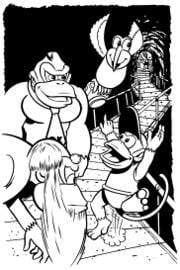
In the 1995 novel Donkey Kong Country: Rumble in the Jungle, Donkey Kong leaves his treehouse in the jungle with his friend Diddy Kong and grandfather Cranky Kong, after discovering that Funky Kong's plane has mysteriously crashed near Big Ape City. They traverse through the Tree Top Town on the edge of the forest, and Donkey Kong takes the lead in confronting and defeating a large group of Kremlings. Later, Donkey Kong uses his "extraordinary lung power" to cry for help from Squawks the Parrot when they find themselves trapped within a mountain cave. After reaching Big Ape City, Donkey Kong is angered to discover that the Kremlings are rebuilding a large factory which is releasing large amounts of pollution into the air. He finds a way for the Kongs to enter the factory by hiding in a Mine Cart, and they locate Funky within a cell. Donkey Kong uses a mini TNT Barrel to break open the cell door, and later uses a powerful shoulder charge to break open the door to the factory's cargo room.
Just like "climbing vines back in the jungle", Donkey Kong climbs a cable within an elevator shaft to reach the factory's defense system. He encounters the most powerful Kremling, Krusha, who threatens to bring him to King K. Rool. Knowing that he is unable to defeat Krusha using strength alone, Donkey Kong tricks him into thinking that inside his backpack is a list of where to find all the Kongs on Donkey Kong Island. This gives him the chance to knock out Krusha using a barrel, and he proceeds to destroy the defense system. While escaping the factory in Funky's repaired plane, he and Diddy Kong decide to enter King K. Rool's zeppelin from the air and plant it with time-delayed TNT Barrels. After choosing to allow the "coward" King K. Rool to escape, Donkey Kong and Diddy re-enter the plane, and celebrate a victory as they watch the zeppelin fall and land on the factory, destroying it with an explosion.
Throughout the novel, Donkey Kong uses a range of physical attacks which were originally seen in the Donkey Kong Country game, including Barrel Rolls, Cartwheel Attacks and Hand Slaps. He also carries a large supply of miniature barrels and TNT Barrels in his backpack, which are utilized against the Kremlings and their weapons.
Donkey Kong Country television series
Donkey Kong is a main character in the 1998 TV series of Donkey Kong Country. In it, Donkey Kong is an anthropomorphic ape who, due to finding the Crystal Coconut in Inka Dinka Doo's temple, is predicted to be the future ruler of Kongo Bongo Island. Ever since, it has been made Donkey Kong's duty to guard the Crystal Coconut until the day it officially proclaims him ruler of the island. However, King K. Rool wants to steal the Crystal Coconut so that he can rule the island, and DK and his pals have to stop him and the Kremling Krew, as well as another villain, Kaptain Skurvy. On this show, Donkey Kong is depicted as somewhat of a slacker who loves bananas above all else, much like his portrayal in recent games. On this show, he is also bipedal as opposed to walking on all fours like he normally does (although he sometimes goes on all fours when running). This would carry over to Donkey Kong 64, though in that game, he stands on all fours when idle.
Mario Kart series
Mario Kart 64
Like Wario, Donkey Kong first appeared in the Mario Kart series in the Nintendo 64 game, Mario Kart 64 (replacing Donkey Kong Jr. from the previous installment). In this game, he is classified as a heavyweight character, along with Bowser and Wario. His personal track is D.K.'s Jungle Parkway.
Mario Kart: Super Circuit
Donkey Kong reappears as a heavyweight character in the Game Boy Advance game, Mario Kart: Super Circuit. Again, Wario and Bowser join him as the heavyweight characters. Donkey Kong does not have his own course in this game.
Mario Kart: Double Dash!!
Donkey Kong appears in Mario Kart: Double Dash!!, along with another Kong, Diddy Kong. Donkey Kong, again, is classified as a heavyweight character. Besides Bowser and Wario, King Boo and Petey Piranha also appear as heavyweight characters. Donkey Kong also gets his own personal track, DK Mountain. He and Diddy share an item, the Giant Banana. Donkey Kong's kart is the DK Jumbo.
Mario Kart Arcade GP
Donkey Kong appears in the arcade game, Mario Kart Arcade GP. He has four special items. They are the Barrel, the 10T Hammer, the Giant Banana, and the Conga. Like most of the characters, Donkey Kong has his own cup, which is simply named DK Cup. In this cup, two of Donkey Kong's personal tracks appear, DK Jungle and Bananan Ruins.
Mario Kart DS
Donkey Kong appears in the Nintendo DS game, Mario Kart DS. Like with his past appearances, Donkey Kong is a heavyweight character, but in this game, he's the lightest heavyweight; the other heavyweight racers include Wario, Bowser, and R.O.B.. Donkey Kong has three personal karts, the Standard DK, the Rambi Rider, and the Wildlife, and he has one personal track, DK Pass.
Mario Kart Arcade GP 2
Donkey Kong appears in the second Mario Kart arcade game, Mario Kart Arcade GP 2. He is a power racer, along with Wario and Bowser. His personal cup is renamed DK Stage, but the same courses appear in the cup.
Mario Kart Wii
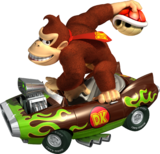
Donkey Kong also appears in the Wii game, Mario Kart Wii. He is classified as a large-sized character, along with Wario, Waluigi, Bowser, King Boo, Rosalina, Funky Kong, and Dry Bowser. He has three courses in this game (with two of them being retro courses): DK Summit, N64 DK's Jungle Parkway, and GCN DK Mountain. Donkey Kong receives a small boost of weight, acceleration, and handling, along with a small mini-turbo boost in this game.
Mario Kart 7
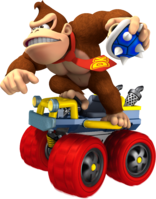
Donkey Kong appears as a racer again in the Nintendo 3DS title, Mario Kart 7, and has his own personal track, DK Jungle. He is classified as a Cruiser-type character in this game, and his speed, weight, and off-road stats are given a slightly above average boost.
Mario Kart Arcade GP DX
Donkey Kong also appears as a racer again in Mario Kart Arcade GP DX. He is once again a heavyweight racer and the Donkey Kong Cup becomes the Don-chan Cup.
Mario Kart 8 / Mario Kart 8 Deluxe
Donkey Kong appears in Mario Kart 8, where he is once again a playable character. His fur has a similar texture as in Donkey Kong Country: Tropical Freeze. While the official website states that he is a heavyweight, Donkey Kong is actually a lighter heavyweight, sacrificing some speed and weight to boost acceleration, handling, and grip. He shares this trait with Waluigi, Rosalina, Roy Koopa and Link.
He is the Staff Ghost for Thwomp Ruins and 3DS DK Jungle.
Donkey Kong also owns a brand of sports drink which appears as a sponsor in the game, called Burning DK.
Donkey Kong returns in the Nintendo Switch port Mario Kart 8 Deluxe, where he now shares stats with only Waluigi and Roy.
Game Boy Camera
Donkey Kong makes a cameo as a stamp for photos in the Game Boy Camera peripheral.
Mario Party series
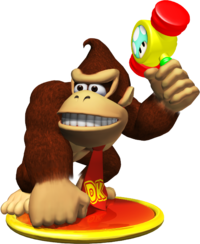
Donkey Kong is a playable character in all of the Mario Party games up until Mario Party 4.
The Mario Party 3 instruction booklet claims that Donkey Kong's favorite item is the Reverse Mushroom. His default partner in Duel Mode is Whomp.
Starting in Mario Party 5, he leaves the playable character roster but gains his own space. He is basically the opposite of Bowser, since when a character lands on his space, something good happens. But when a Koopa Kid lands on his space in story mode, he acts surprised and DK punches him, making the Koopa Kid lose 10 coins.
In Mario Party DS, Donkey Kong is the primary feature of his own board, DK's Stone Statue. During story mode, Donkey Kong is turned to stone by a Dry Bones while he and Diddy run to Bowser's Castle after being invited to a banquet hosted by him. The player has to win the game and beat the Dry Bones to free Donkey Kong. The ape then runs away to the castle. At the end, he is seen with Diddy enjoying the meals Bowser had prepared as traps for the 8 "party characters".
In Mario Party 9, Donkey Kong appears as the "boss" of his own board, DK's Jungle Ruins. His boss minigame is called DK's Banana Bonus. During the minigame, Donkey Kong tosses Golden Barrel Cannons into the area, allowing the players to access banana bunches that are higher up.
Donkey Kong returns as a playable character in the Wii U title Mario Party 10, marking his first playable appearance in the series since Mario Party 5.
Donkey Kong is also playable in Mario Party: Star Rush, marking his first appearance as an unlockable playable character and his second appearance as a playable character in the series since Mario Party 5. He can be unlocked if players earn enough part points to reach level 8 or if they scan a Donkey Kong amiibo. In Toad Scramble, he can break barrels to earn coins. His Brawny Dice Block has a 1 out of 3 chance to roll a 10, but other than that it will return a 0.
Donkey Kong appears in Mario Party: The Top 100 as an non-playable opponent in Jump, Man and Vine Country, both minigames returning from Mario Party 7. Donkey Kong returns in Super Mario Party as an unlockable playable character.
Mario Tennis series
In the Mario Tennis series, Donkey Kong appears as a playable Power-type character in most titles, the only exception being Mario's Tennis where Donkey Kong Jr. is playable.
In Mario Tennis for the Nintendo 64's intro, Donkey Kong participates in the tournament, where he loses to Mario (allowing the latter to advance to a semi-finals match against Yoshi). His doubles partner is Donkey Kong Jr., but if he isn't unlocked yet, Donkey Kong's doubles partner is Yoshi instead.
Donkey Kong appears in Mario Power Tennis as a playable character. His offensive power shot is the Barrel Cannon Blast, and his defensive power shot is the Boomerang Banana Return. When Donkey Kong wins the championship, Toad brings him the trophy, and he grabs it with Toad still holding on. He waves it around, shaking up Toad in the process. When he finally stops, Toad faints, and Donkey Kong scratches his head. Donkey Kong's taunt is showing muscles and his doubles partner is Diddy Kong.
In Mario Tennis Aces, Donkey Kong reappears as a playable character. He also appears in the adventure mode, where he blocks the entrance to Piranha Plant Forest until the player completes the tutorials at Bask Ruins. When the player beats the tutorials, he challenges Mario to a match of tennis. When the player beats him then, he allows the player to pass.
Super Smash Bros. series
Template:SSB Infobox Donkey Kong is playable in all five Super Smash Bros. games. Donkey Kong is always, as expected from a heavyweight, one of the strongest characters in the games. When he picks up a character, he also has the power to carry them a short distance, which is something that none of the other characters can do. He can also carry large objects, such as barrels and crates, without having his speed hindered.
Donkey Kong's special moves are Giant Punch, a punch that can be charged to increase its power, Headbutt, which has him headbutt his opponents into the ground, Spinning Kong, which has him spin and lets him momentarily float, and Hand Slap, which has him repeatedly stamp on the ground. For his Final Smash, he uses Konga Beat, pulling out two Bongos and tapping them in time to the beat of Donkey Kong Country's first level, with each tap sending shockwaves that deal damage to opponents.
Donkey Kong is unique from other heavyweights; though he is unsurprisingly strong, he is also fast for a character of his weight. His combination of power, speed, and good range from his size and long arms contributes to making him arguably a versatile character to use throughout the Smash games.
Even though Donkey Kong is a Mario franchise character, his emblem is the DK symbol, which represents his own franchise. Unlike in the Mario series titles, Donkey Kong is given a gorilla voice for the Super Smash Bros. series. This is even more noticeable in Super Smash Bros. Brawl.
Super Smash Bros.
Template:Main-external In Super Smash Bros., Donkey Kong is a default character. In Classic Mode, the player must fight Giant Donkey Kong (spelled in-game as Giant DK), where they are provided two partners to help. It is the only match where the player is assisted by two fighters instead of one. As with other giant characters, Giant Donkey Kong is more resistant to knockback and can withstand around 350% damage before being knocked off the stage. Donkey Kong is the heaviest character in this game, weighing 141 units; however, he is somewhat sluggish, though his moves boast very high power.
Super Smash Bros. Melee
Template:Main-external Donkey Kong is also a playable character in Super Smash Bros. Melee. Once again, he is a default character.
In the new one-player mode, Adventure, the player must first fight two Tiny Donkey Kongs and then fight Giant Donkey Kong at Jungle Japes. By picking up a Super Mushroom, Donkey Kong can become larger briefly, before reverting to normal. In Giant Melee, the player can play as Giant Donkey Kong or fight against him. Similar to Super Smash Bros., Donkey Kong is one of the possible giant opponents who appears in stage 5 of Classic Mode, and is fought at Jungle Japes.
Giant Donkey Kong appears in two events of Event Mode:
- In Event 2, the player plays as Giant Donkey Kong, whose objective is defeating Tiny Donkey Kong
- In Event 25, the player must defeat Giant Donkey Kong using Giant Bowser.
Donkey Kong's weight is decreased from 141 units to 114, no longer making him the heaviest character in the game; instead, that title goes to fellow heavyweight Bowser. As compensation, however, Donkey Kong's movement and attack speed are both much faster, while his moveset receives a mix of buffs and nerfs. Starting from Super Smash Bros. Melee, Donkey Kong is a speedy heavyweight with decent combo ability.
Super Smash Bros. Brawl
Donkey Kong reappears as a playable character in Super Smash Bros. Brawl. His moves are carried over from Super Smash Bros. Melee, and he, like other characters, is given a Final Smash, his being the Konga Beat, most likely inspired by the games Donkey Konga and Donkey Kong: Jungle Beat. Some even go as far to say Donkey Kong's Final Smash is based on his instrumental attack from Donkey Kong 64, in which he uses a pair of Bongos to create a shock-wave that can defeat any enemy on which it is used, except bosses (mainly because they can't be used in any boss battles). Donkey Kong also gets a new white recolor. Donkey Kong's weight is slightly increased to 116 units from 114.
An 8-bit Donkey Kong appears on the 75 m stage (which is based on the third level in the original Donkey Kong). Touching him will harm the player.
Donkey Kong appears in several events, usually in giant form.
- In Event 9: "The Monster beneath the Earth", Giant DK is a hidden opponent. If the player does not KO the two Diddy Kongs fast enough, Giant DK must be fought as well.
- In Event 22: "Monkeys Unite", Giant Donkey Kong is Diddy Kong's partner in a fight against Sheik and Lucario.
- In Event 27: "Three-Beast Carnage", Giant Donkey Kong is among the three giant opponents fought by R.O.B., along with Giant Bowser and Giant Charizard.
Like Super Smash Bros. Melee, Donkey Kong briefly turns larger from using a Super Mushroom. In Giant Brawl, the successor to Giant Melee, the player can either play as Giant Donkey Kong or fight against one.
Ironically, despite his common appearances in Super Smash Bros.'s 1P Game as well as Super Smash Bros. Melee's Classic Mode, Donkey Kong does not appear in Classic Mode as a giant opponent. He shares this trait with the Zelda characters and Diddy Kong.
The Subspace Emissary
The Koopa Troop and Bowser steal Donkey Kong's Banana Hoard. As a Hammer Bro drives a car which contains all the bananas of Donkey Kong's, Donkey Kong watches it from a cliff. Hammer Bro and the Goombas aboard the car spot Donkey Kong and shoot Bullet Bills at him. However, Diddy Kong comes out from a bush, and, with his Peanut Popguns, shoots the Bullet Bills. Donkey Kong and Diddy Kong then follow the Hammer Bro to retrieve the Banana Hoard. After finding their bananas, Bowser appears from behind with a Dark Cannon. As Bowser charges the cannon, Donkey Kong, realizing the danger, charges his Giant Punch. He then launches Diddy to the sky and out of harm's way, sacrificing himself in the process as Bowser shoots him with the Dark Cannon and turns him into a trophy. Later, Diddy Kong, who (forcefully) enlisted the help of Fox McCloud and Falco Lombardi, sees a ship carrying Donkey Kong's trophy form to a mysterious floating island. Falco then follows it with his Arwing and takes the little Kong with him. He then drops him, and Diddy gets on his Rocket Barrel, takes out his Popguns, and shoots the ship. After seeing this, Captain Falcon and Captain Olimar decide to help him and jump to the ship. Diddy frees Donkey Kong, and all four fight the Primids and other enemies.
The ship takes them inside a factory producing Subspace Bombs, and they encounter various R.O.B.s that live on the island. They later meet up with Pikachu and Samus Aran and see the Ancient Minister and a plethora of R.O.B.s. After Ganondorf manipulates the R.O.B.s into activating all of the Subspace Bombs, the Ancient Minister is shown to be R.O.B., the leader of all the lesser R.O.B.s who were forced to work for the Subspace Army. R.O.B. then fights alongside the others. Donkey Kong carries R.O.B., who refuses to leave his kind behind to perish, as they all flee to escape the doomed island on Captain Falcon's summoned Falcon Flyer. Meta Ridley then appears and follows behind to impede group's escape, forcing DK and his group to fight him. After that, they all meet up with the other heroes.
Donkey Kong and the other smashers enter Subspace and meet Tabuu, who turns everyone into trophies with his Off Waves. However, King Dedede had anticipated this and created badges that revived certain fighters back into their original forms without having to touch them. With his team, consisting of Luigi and Ness, Dedede rescues Donkey Kong and most of the others, although some of them are rescued by Kirby. They also recruit Bowser, Ganondorf, and Wario after they are informed about Tabuu. At the end of the Great Maze, Sonic the Hedgehog shows up and helps weaken Tabuu's Off Waves so that Donkey Kong and the others are able to beat him.
Super Smash Bros. for Nintendo 3DS / Wii U
Donkey Kong returns as a playable character in Super Smash Bros. for Nintendo 3DS and Super Smash Bros. for Wii U. His moveset has remained largely intact, but has nevertheless received a few noticeable changes, most notably his unique forward throw and Final Smash; Donkey Kong's weight is also increased from 116 units to 122. Like the majority of the cast (DLC fighters notwithstanding), each of Donkey Kong's special moves now possess two variants. Giant Punch has Lightning Punch and Storm Punch; Headbutt has Jumping Headbutt and Stubborn Headbutt; Spinning Kong has Chopper Kong and Kong Cyclone; and Hand Slap has Focused Slap and Hot Slap.
Super Smash Bros. Ultimate
Template:Main-external Donkey Kong appears as a playable character in Super Smash Bros. Ultimate. He has a new Final Smash, Jungle Rush, which involves him rapidly punching an opponent, as a reference to his attack method in Donkey Kong Jungle Beat. Donkey Kong is more expressive; when he charges his Giant Punch, he starts scowling, and using it in the air no longer makes him helpless. He is heavier, tying with King Dedede in weight, and Headbutt now gives Donkey Kong super armor for a short time. His recovery is also extended by the reintroduction of directional air dodge, can use any ground attack out of a run, and use any aerial attack while holding on the ladders officially called a "ladder attack". However, Giant Punch has more ending lag and Aerial Spinning Kong is weaker. His Classic Mode is titled "Journey to New Donk City". Donkey Kong's down tilt is officially nicknamed the Slouch Slap while his forward throw is referred to as Kong Carry. His weight has been further increased to 127 units; however, he is no longer the second heaviest fighter in the game, instead giving up that title to his arch-nemesis, King K. Rool. Donkey Kong is tied with King Dedede for the third heaviest fighter.
Owing to King K. Rool's ties to Donkey Kong, Donkey Kong appears alongside Diddy Kong in K. Rool's debut trailer for Super Smash Bros. Ultimate. Specifically, Donkey Kong lounges lazily in his tree house after eating some bananas while watching various video game heroes confronting their respective nemeses on his TV, only to be startled by quakes before looking outside with Diddy to investigate. They then see an ominous and familiar shadow, only for it to be revealed to be King Dedede wearing a cape and King K. Rool's mask, to their surprise. King Dedede then proceeds to laugh at the practical joke he played on them, only for him to be smacked upside the head and knocked away by the actual King K. Rool, much to Donkey and Diddy Kong's horror, with King K. Rool roaring. In the ending of the trailer, Donkey Kong is knocked backwards, only to proceed to charge at his arch-nemesis on all fours, with King K. Rool doing the same in kind before proceeding to have their fists make contact with each other with enough force as to cause a shockwave to be emitted throughout the jungle.
In the Adventure Mode, World of Light, Donkey Kong is present when he and other fighters oppose their ultimate enemy, Galeem. Donkey Kong, like many other fighters, except Kirby, is hit by the beam of light and imprisoned in the World of Light. Donkey Kong is found in the jungle segment of the Light Realm, on a space that looks like the treehouse he lives. Donkey Kong, upon being defeated, joins the party and fight Galeem.
A giant Donkey Kong based on the one from the original Super Smash Bros. also appears as the final opponent of Jigglypuff's route, due to its route being a callback to the original game.
Classic Mode route
By completing Donkey Kong's Classic Mode route, it is possible to unlock Bowser, Pokémon Trainer, Rosalina & Luma, King Dedede, Sheik, Greninja, Diddy Kong, and Duck Hunt.
Donkey Kong's Classic Mode route initially has him fight Diddy Kong, who joins him as a partner in all subsequent battles. Together, they fight opponents who live in urban settings, with their penultimate battle being against the Mario Bros. The penultimate battle alludes to the rivalry between Donkey Kong and Mario.
| Journey to New Donk City | ||||
|---|---|---|---|---|
| Round | Opponent(s) | Rule | Stage | Song |
| 1 | Diddy Kong | Kongo Jungle | Jungle Level (64) | |
| 2 | King K. Rool | Team Battle (Ally: Diddy Kong) |
Kongo Falls | Gang-Plank Galleon |
| 3 | Wario, Captain Falcon | Team Battle (Ally: Diddy Kong) |
Pilotwings | Gear Getaway |
| 4 | Ness, Lucas | Team Battle (Ally: Diddy Kong) |
Onett | The Map Page / Bonus Level |
| 5 | Inkling Girl, Inkling Boy | Team Battle (Ally: Diddy Kong) |
Moray Towers | Donkey Kong / Donkey Kong Jr. Medley |
| 6 | Mario, Luigi | Team Battle (Ally: Diddy Kong) |
New Donk City Hall | New Donk City |
| Final | Master Hand, Crazy Hand (intensity 7.0 or higher) | Team Battle (Ally: Diddy Kong) |
New Donk City Hall (Ω) | Master Hand Master Hand / Crazy Hand (intensity 7.0 or higher) |
Donkey Konga series
Donkey Konga
In Donkey Konga Donkey Kong discovers a magical set of bongos on a beach. Once Cranky Kong realizes his grandson’s potential for being a professional, Donkey Kong and Diddy Kong set out to become famous. On their travels, they revisit many locales and play popular songs through cooperative performances and musical face-offs.
Donkey Konga 2
In Donkey Konga 2, when Dixie Kong joins Donkey and Diddy for a practice session, the trio realizes their potential for musical chemistry. Shortly after, they set out on another tour, which is very similar to Donkey and Diddy Kong's first one. However, they change up their song list to include current popular songs of the time.
Mario vs. Donkey Kong series
Mario vs. Donkey Kong
In the opening for Mario vs. Donkey Kong, Donkey Kong is channel surfing when sees a commercial for the new Mini-Mario toy. Desiring one for himself, Donkey Kong rushes to the local toy store, only to find that they are sold out. However, he notices the Mario Toy Company building nearby, and he breaks in and steals a sack full of the Mini-Marios. Donkey Kong is fought at the end of each world, after Mario has collected all of the Mini-Marios in the world. Depending on the world, Donkey Kong uses several tactics during his battles.
After a while of being chased, Donkey Kong checks the sack, only to see that it is entirely empty. Mario, the toys, and three Toads laugh at him. Enraged, Donkey Kong grabs the Toads and climbs up a nearby a building with them. After Donkey Kong is defeated again, he falls off the building, only to land on a truck containing several Mini-Marios, which he decides to steal. Donkey Kong is then fought at the end of each world once more, though his arenas are variants of their original versions. After Mario defeats Donkey Kong in the final battle against his robot, Mario gives Donkey Kong his own Mini-Mario toy.
Mario vs. Donkey Kong 2: March of the Minis
In the sequel, Mario vs. Donkey Kong 2: March of the Minis, he now works in the Mario Toy Company. Donkey Kong then kidnaps Pauline, the V.I.P. guest, when she chooses Mario's Mini-Mario toy over his Mini-DK toy. It is likely that he is the manufacturer of the Kong toys (besides Mini DK) that appear in the game. In the end, Pauline is safe as DK treated her to gifts and food. She then shows her appreciation by kissing the DK toy he gave her.
Mario vs. Donkey Kong: Minis March Again!
In Mario vs. Donkey Kong: Minis March Again!, Donkey Kong is waiting in a line to buy a ticket for the opening of the Super Mini Mario World theme park. However, by the time he reaches the ticket booth, the tickets are sold out. Donkey Kong becomes furious over this, and therefore decides to break in while taking Pauline with him. Mario brings out his Mini Marios and chases Donkey Kong through all the theme park's floors. Later, when Mario rescues Pauline, Donkey Kong turns off the lights and escapes with Pauline through a nearby window. After four more floors are cleared, Mario walks into a room to see Donkey Kong, Pauline, and all the Toads smiling. Pauline reveals that it was all a test for the Mini Marios, who all passed with flying colors, much to Mario's surprise.
Mario vs. Donkey Kong: Mini-Land Mayhem
In Mario vs. Donkey Kong: Mini-Land Mayhem, Donkey Kong arrives at the newly-opened Mini-Land to desperately get a Mini Pauline, only to find out that he is the 101st guest to arrive and it sold out after 100. Donkey Kong gets incredibly mad and, in his rage, kidnaps the real Pauline, forcing Mario and his force of Mini Marios to rescue her. In the end, its shown DK is given a Pauline doll by Mario and the trio rides the Ferris wheel together.
Donkey Kong Jungle Beat
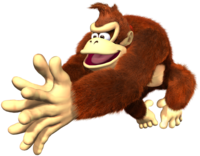
In Donkey Kong Jungle Beat, it is never clear what compelled Donkey Kong to travel to the Banana Kingdom and its sister lands. Nevertheless, the ape sets out on a mission to take down the possessed Dread Kong who ruled it. Upon doing so, he sets out to the other nearby kingdoms. Utilizing his great strength, Donkey Kong, with no support other than his own, fights through sixteen such kingdoms, eventually conquering the evil Cactus King. After the fight, the other Kongs meet Donkey Kong, now free of Ghastly King's curse. Presumably, Donkey Kong allows them to resume their duties. Donkey Kong may not have had honorable intentions for entering the kingdoms, instead desiring more bananas and to improve his reputation. Donkey Kong's personality in this game is drastically different from his previous incarnations, most noticeably in his aggressiveness.
DK series
DK: King of Swing
Donkey Kong has more work to do during DK: King of Swing. It is time for the annual Jungle Jam, a festival for the Kongs. However, King. K. Rool returns and steals all of the medals needed to have the festival. Donkey Kong and Diddy Kong go after him to get the medals back. In the end, they defeat K. Rool, and the festival is celebrated.
DK: Jungle Climber
In DK: Jungle Climber, Donkey Kong, along with Diddy, Dixie, Cranky, Wrinkly, Funky, and Candy, is resting on the beach when Diddy notices a giant banana. Donkey Kong, Diddy, and Cranky go up to the top and find a Banana Spaceship. Donkey Kong fights this spaceship and finds Xananab. They find that K. Rool and the Kremlings have escaped with his five Crystal Bananas, and he needs them back. Donkey Kong and friends agree, and the four travel through the islands, going through wormholes and other lands, such as Glass Labyrinth, Toybox, and Veggie Patch. At the end of each island, Donkey Kong fights one of K. Rool's assistant Kremlings and eventually defeats the third Kremling. K. Rool then flees to the King Kruiser IV. Donkey Kong chases him and eventually reaches K. Rool's spaceship. There, he defeats the fourth Kremling as K. Rool goes through a wormhole. Donkey Kong follows, and the group lands on Xananab's home planet. There, they fight K. Rool, which is no easy task. Eventually, the DK Crew once again wins, and Donkey Kong, Diddy, and Cranky get to eat as many bananas as they desire.
Mario Baseball series
Donkey Kong appears as a fully playable default character in Mario Superstar Baseball and Mario Super Sluggers as the team captain of the DK Wilds with Diddy Kong as subcaptain and his home stadium is the Donkey Kong Jungle. Unlike most batters, Donkey Kong uses a boxing glove to punch the ball. There is a small contact point between the ball and the glove, making it more difficult for Donkey Kong to land a hit, but Donkey Kong has great hitting power. Donkey Kong has also above-average pitching. Donkey Kong has below average running and fielding stats, however. In this game, DK has good chemistry with Diddy Kong, Dixie Kong, and Petey Piranha.
Donkey Kong's special ball and bat is called the Banana Ball. This makes the pitched or hit ball have a banana-like trajectory. Donkey Kong's player abilities include Clamber, which allows him to climb walls and catch high-flying balls that would otherwise be fair or home-runs. He also has Laser Beam, which makes his throws from outfield to home quick, potentially preventing runners from scoring a point.
In Mario Super Sluggers, Donkey Kong is mostly unchanged. He still uses a boxing glove to bat. His Star Pitch and Star Swing are also altered to Barrel Ball and Barrel Swing, which involve him throwing a barrel. He has also lost his Laser Ball ability. As for his stats, Donkey Kong has better batting, but with worse fielding and even worse running. His pitching also lost one point, but it remains above-average. In this game, DK has good chemistry with Diddy Kong, Dixie Kong, Tiny Kong, Funky Kong and Baby Donkey Kong, and his chemistry with Kritter and King K. Rool is bad, which is odd considering that they are on DK's team. Donkey Kong has the second highest batting stat in this game, only surpassed by Bowser, King K. Rool, and Petey Piranha.
Donkey Kong Barrel Blast
In Donkey Kong Barrel Blast, Donkey Kong and his friends then decide to go on a new adventure, a race with a plethora of Kremlings and their leader, K. Rool. Donkey Kong and his friends and foes alike compete in the Jungle Grand Prix, in which everyone rides on jet-powered bongos. His rival in this game is a Kritter, and his stats are all average. If the player completes all of Candy's Challenges, Ultra Barrel DK will be unlocked, whose stats are all maxed out. To select Ultra Barrel DK on the character select screen, the player needs to highlight Donkey Kong, hold ![]() and press
and press ![]() .
.
Mario Strikers series
Donkey Kong appears in both Super Mario Strikers and Mario Strikers Charged as a default playable character. Donkey Kong plays the same as the other characters; the only difference is that in Super Strikes, it is easier to land the white needle on the dark green zone, but more difficult to land it in the surrounding light green zone.
In Mario Strikers Charged, Donkey Kong is a Power character. While his tackling and his shooting are excellent, his movement and his passing are poor. Donkey Kong's deke involves him beating his chest and knocking away any would-be attackers. His Super Ability is Thunder Wham! He pounds the ground with his fists, creating a shockwave that sends any nearby player away, including his teammates. Alongside Wario, Hammer Bro, Birdo, and Boo, Donkey Kong has a unique way of shooting the ball. He shoots it by picking it up and headbutting it towards the goal.
Punch-Out!!
In the Wii title, Punch-Out!!, an updated sequel of the classic NES game, Donkey Kong appears as a hidden bonus opponent, found initially in the game mode, Mac's Last Stand. If the player fights Donkey Kong in that game mode, they can fight him at any time in Exhibition mode.
Mario & Sonic series
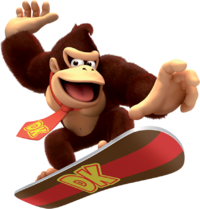
Donkey Kong, along with Birdo, Goomba, and a few others, were originally planned to appear as playable characters in Mario & Sonic at the Olympic Games, but were scrapped prior to the end-product for unknown reasons.[7] However, Donkey Kong did appear in all 4 sequels.
Mario & Sonic at the Olympic Winter Games
In the Wii and Nintendo DS versions of the video game Mario & Sonic at the Olympic Winter Games, he is a power playable character. His main rival is Knuckles the Echidna.
- Adventure Tours
In Icepeak, Mario, Sonic, and Toad find Donkey Kong crying due to one of his bananas fell in a deep ledge which he can't reach. Silver then comes uses his psychic powers to bring the banana back to him. Donkey Kong thanks Silver and challenge him to Moguls. When Silver finally defeats him, Donkey Kong joins the group.
Toad tells him that there's a pole back in Polastraits. There are also obstacles on the pole, such as ice and bombs. When the ape presses the button on the pole, a bridge forms. Later in Icepeak, Donkey Kong who meets Vector challenge him a match of Short Track 500m. After beating Vector, Donkey Kong wants him to join the group which Vector agrees.
Mario & Sonic at the London 2012 Olympic Games
Donkey Kong returns in the third installment Mario & Sonic at the London 2012 Olympic Games, as once again a power type playable character.
- Story Mode
Donkey Kong is practicing at the Wrestling Stadium, where Espio the Chameleon and Miles "Tails" Prower meet him. E-123 Omega who slips into him causes his banana to drop. Donkey Kong gets mad and Omega challenges him to a Wrestling-Freestyle Match which DK wins. A battery part comes up of Omega which Eggman put into Omega causing him to go amok. Omega who forgets what happen apologize to DK for causing his banana to fall.
Mario & Sonic at the Sochi 2014 Olympic Winter Games
Donkey Kong returns in the fourth installment as a power type athlete once again.
Mario & Sonic at the Rio 2016 Olympic Games
Donkey Kong returns in Mario & Sonic at the Rio 2016 Olympic Games and is once again a power type. In the Nintendo 3DS version, he is exclusive to Boxing and Beach Volleyball.
Mario Sports Mix
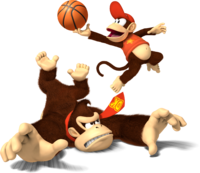
Donkey Kong appeared in Mario Sports Mix, where he was classified as a Powerful type character. While his technique is average, along with a very high power stat, Donkey Kong's speed is quite slow. His stage court is DK Dock.
Donkey Kong's special shot involves slamming the ground (which would briefly stun opponents) and then aiming the ball/puck at the goal, or at an opposing player. In Dodgeball, Donkey Kong can repel dodgeball attacks by spinning his body while having his arms stretched out. However, this defensive maneuver is rendered useless when the dodgeball is equipped with an item.
Fortune Street
Donkey Kong appears as an opponent in single player mode in Fortune Street, but he is playable in multiplayer. He is a Rank D opponent, which means he spends less investing in his property than most characters spend on their propeties.
Super Mario Maker
If the player scans the Donkey Kong amiibo on the Wii U GamePad while the game Super Mario Maker is running, they will be granted access to a Mystery Mushroom that, once collected by Mario, transforms him into Donkey Kong. He can become playable afterwards; much of his animations are based on the ones from Donkey Kong Country, while the sound effects that are heard during some of his actions, such as falling into a pit or clearing the level, are from the arcade version of Donkey Kong.
Mario Sports Superstars
Donkey Kong appears as a playable captain character in Mario Sports Superstars. In most sports, he is classified as a Power type character, giving his shots more power (and thus speed), as well as giving him more stamina in horse racing. In golf, DK's default drive is 224 yards, and his shots travel slightly low in a draw trajectory.
Super Mario Odyssey
An 8-bit Donkey Kong from the original Donkey Kong appears as an obstacle in Super Mario Odyssey. In A Traditional Festival! of the Metro Kingdom, Mario has to traverse through a lengthy 2D stage while Donkey Kong tosses barrels down slanted beams. Once Mario reaches him, he can defeat Donkey Kong by hitting all four ? Blocks underneath him. He also appears in a 2D segment in the Darker Side during Long Journey's End. The entirety of Metro Kingdom's city, New Donk City, is meant to be a tribute to the Donkey Kong series, as it features various references to the original arcade title and the Donkey Kong Country games. A graffiti painting of Donkey Kong's original artwork can also be seen in the city.
Other appearances, cameos, and references
Donkey Kong has made a fair few appearances outside the extended Mario series. In Banjo-Tooie, for the Nintendo 64, Goggles plays with a Donkey Kong doll. Additionally, Donkey Kong was going to appear in the games Diddy Kong Pilot, Donkey Kong Coconut Crackers, and Donkey Kong Racing but, after Rare was bought by Microsoft, the games were canceled, as Rare lost the rights to use Donkey Kong and all the other Donkey Kong related characters.
In Template:Wikia, a game developed by Rare, Donkey Kong's face can be seen on a mountain in the first mission of the game, the Dam.[8] In both this game and its spiritual successor Template:Wikia which was also developed by Rare, there is an unlockable cheat called "DK Mode". This cheat will make it so that all characters in those games will have a similar body shape to Donkey Kong, with a larger head and arms extending all the way to the ground so as to resemble Donkey Kong's primal posture.
A skeleton named Bink from Mario & Luigi: Superstar Saga strongly resembles Donkey Kong, although this quirk was not carried over to that game's remake. Bink even throws barrels and eats bananas. While Donkey Kong himself does not appear in Yoshi's Woolly World and Poochy & Yoshi's Woolly World, a pattern based on him, named Donkey Kong Yoshi, is featured via amiibo.
Donkey Kong also appears in Skylanders: SuperChargers under Turbo Charge Donkey Kong. He appears alongside Bowser with a special figurine sold exclusively on the Wii U starter pack. However, due to an agreement between Nintendo and Activision, they are playable only on the Nintendo versions of the game. He also appears in the Wii U and Switch versions of Skylanders: Imaginators.
Outside of video games, Donkey Kong appears as a property in Nintendo Monopoly. He takes the place of Marvin Gardens and costs $280. Also, a a monster truck based on Donkey Kong appeared at Monster Jam 2007.
Donkey Kong also makes an appearance in the film Pixels. Aside from appearing in gameplay of the Donkey Kong arcade game, he appears on Earth as a clone created by aliens. In the film, the clone throws pixelated barrels at protagonist Sam Brenner (played by Adam Sandler) in a location very much like 25m. Brenner manages to avoid the barrels, defeat Donkey Kong, and rescue the Kong's hostages (who were positioned in the same location that Pauline was in Donkey Kong).
In the Super Mario Mash-Up Pack in the Wii U and Nintendo Switch versions of Minecraft, Donkey Kong appears as a playable skin.
The game Mario + Rabbids Kingdom Battle features a boss named Rabbid Kong, a large, ape-like Rabbid that strongly resembles Donkey Kong, right down to wearing his signature necktie. A figure of Donkey Kong on a girder appears in the introductory cutscene, as well. DK himself was added as a playable character in the Donkey Kong Adventure story expansion pack in June 2018. This pack sees DK joining forces with Rabbid Peach and Rabbid Cranky, and taking on Rabbid Kong and his army.
Although Donkey Kong himself does not appear in Castlevania: Symphony of the Night and similar games in the Castlevania franchise, the enemy creature Skeleton Ape was based on Donkey Kong, right down to using barrels as its primary weapon.
Donkey Kong, or more specifically, his debut role was given an indirect reference in the game Baten Kaitos Origins, where Guillo, after Gibari threw a barrel at various guards, sarcastically asks the latter if he's "some monkey who's run off with a pretty wench?"
General information
Physical appearance
Donkey Kong is a Kong who sports a burly physique; in addition to having particularly large pecs, biceps and triceps, he is noted to weigh 800 pounds (363 kg) according to Microbuffer, the talking microphone that serves as the announcer for the fight against K. Rool in Donkey Kong 64, as well as having the traditional large feet of primates with opposable thumbs. Donkey Kong also has brown fur, with the fur on his head being distinctly shaped to the point of looking like a hairstyle. As of Donkey Kong Country: Tropical Freeze, his fur has also consistently sported a realistic texture. The shade of brown his fur is colored, however, has been inconsistent between games, being either a lighter shade or its original darker shade. Donkey Kong wears only a single item of clothing: a red necktie with the "DK" logo printed on it in yellow.
Within the Super Smash Bros. series, Donkey Kong's appearance has changed. In Super Smash Bros., Donkey Kong was somewhat cartoonish in appearance, though his design did not originate from a specific Mario or Donkey Kong game. In Super Smash Bros. Melee, Donkey Kong gains a darker color scheme, while his design appears to have more detailing; Donkey Kong is also shown with teeth, which are colored white. In Super Smash Bros. Brawl, Donkey Kong's fur is lighter in color, but it is further detailed. Donkey Kong's teeth are now yellowish in color. In Super Smash Bros. for Nintendo 3DS / Wii U, Donkey Kong's fur receives even more detail, akin to Donkey Kong Country: Tropical Freeze, though he has a more vibrant color scheme. In Super Smash Bros. Ultimate, Donkey Kong gains a more subdued color scheme, though not to the same extent as Melee or Brawl; additionally, his fur is slightly less detailed, though his necktie has simple detailing.
Throughout the Super Smash Bros. series, Donkey Kong has had eight alternate costumes to choose from; in Super Smash Bros. and Super Smash Bros. Melee, he has 5 costumes; in Super Smash Bros. Brawl , he has 6 costumes; lastly, in Super Smash Bros. for Nintendo 3DS / Wii U and Super Smash Bros. Ultimate, he has 8 costumes. Donkey Kong's first alternate costume gives him black fur, making him resemble his in-game sprite in Donkey Kong '94 and Donkey Kong Land; his second alternate costume gives him red fur, resembling his appearance in the original Donkey Kong; his third alternate costume gives him blue fur, resembling one of his alternate colors from Mario Golf and Donkey Kong 64's multiplayer mode; his fourth alternate costume gives him green fur, having no inspiration. In Melee, Donkey Kong's black costume receives a blue tie, his red costume receives a navy blue tie, and his blue costume receives a purple tie. In Brawl, Donkey Kong's black costume receives a yellow tie with green insignia and his blue costume receives a lavender tie; his green costume is much darker. Donkey Kong also gains a fifth alternate costume with white fur, later inspiring Super Kong's colors. In 3DS / Wii U, Donkey Kong's green costume regains its pre-Brawl color, while his sixth and seventh alternate costumes are introduced: the former gives Donkey Kong a light blue tie and golden brown fur, resembling one of his alternate colors from Mario Golf; the latter gives Donkey Kong a yellow tie and pink fur, resembling Junior (II)'s color in Donkey Kong Jr. Math.
Speech
In the Donkey Kong arcade game, the original Donkey Kong only spoke in growls as he took Lady (or Pauline) on top of a construction site. Saturday Supercade depicted him with the ability to speak broken English in contrast to Donkey Kong Jr., his son. While he mainly verbalized realistic ape noises in-game, the instruction manuals for the Donkey Kong Country, Donkey Kong Land and Donkey Kong Country 2: Diddy's Kong Quest showed that the current Donkey Kong has the ability to speak rather intelligently, which was also seen during the ending of Donkey Kong Country 3: Dixie Kong's Double Trouble!. Donkey Kong later spoke intelligibly in a few Club Nintendo comics, as well as Super Mario Kun. Donkey Kong first received voice acting in the 1998 computer-animated Donkey Kong Country television series, where he was portrayed by Richard Yearwood. Donkey Kong next received voice acting in Donkey Kong 64, where he was portrayed by Grant Kirkhope, a composer for Rare Ltd. and the Donkey Kong franchise. Here, Donkey Kong had a few lines where he spoke broken English while referring to himself in the third person. Grant Kirkhope would continue to portray Donkey Kong until 2006; unlike Donkey Kong 64, Mr. Kirkhope would provide a mixture of cartoony gorilla noises and actual words/phrases (though in fluent English). After 2006, Takashi Nagasako took over as Donkey Kong's voice actor, though he solely provided him with a cartoonish gorilla noise; the lone exception is Donkey Kong's ability to say his name. In current games where Donkey Kong is intended to speak in full sentences, there is in-game text to signify what he's saying. In the early Mario Party games, as well as the Super Smash Bros. series, Donkey Kong is instead given realistic gorilla roars instead of a voice actor.
Personality
In the games, Donkey Kong, despite his carefree and lazy lifestyle, is a brave and friendly hero who highly cares for his friends and Banana Hoard. However, in spite of his laid-back demeanor, he will become enraged when his bananas are stolen or threatened in any way or when his friends are harmed. He is also sometimes depicted as somewhat dimwitted; in Fortune Street, this is referenced by Toad remarking how Donkey Kong is the brawn and Diddy Kong is the brains. Despite this, his intelligence has been portrayed inconsistently: DK speaks fluent English much like the other Kongs (particularly during the Donkey Kong Country series), yet speaks in broken, third-person English for his few lines in Donkey Kong 64. In The Subspace Emissary, Donkey Kong had a bit more common sense compared to Diddy; seeing the danger of the the Dark Cannon Bowser wielded, he chose getting his friend, who was ready to fight, to safety instead of going into a surely dangerous battle. In Snake's codec conversation on Donkey Kong in Super Smash Bros. Brawl and Super Smash Bros. Ultimate, Otacon claims that Donkey Kong seems "pretty smart" for an ape.
In the TV series, Donkey Kong's personality is largely the same, albeit depicting him as lazy instead of carefree. Between himself and Diddy Kong, Donkey Kong is shown to have much more common sense when it came to morality, as shown in I Spy with My Hairy Eye where he was at first against using the Crystal Coconut to wish for more bananas until Diddy manipulated him into doing it. Donkey Kong also seems to get startled much easier and is more sensitive, with an aggressive disposition to King K. Rool, Kaptain Skurvy and their goons.
Powers and abilities
Unlike most characters, who have some kind of special power, Donkey Kong relies mainly on his brute strength. He sometimes has the title of "The strongest of the Kongs", though this claim may refer to his combat abilities instead of strength alone, as some Kongs like Chunky Kong and Sumo Kong are clearly larger and stronger than Donkey Kong. In the original Donkey Kong he had a seemingly unlimited supply of Barrels, and could throw them easily. This carried on to the Donkey Kong Country games, where he can pick up and throw Barrels with ease. Also in Donkey Kong Country, he can destroy certain enemies that Diddy Kong cannot hurt with a single jump. In Donkey Kong: Jungle Beat, his strength is shown yet again, it makes him so strong that when he claps, a sound-wave is produced. This is his main attack throughout the game. In the ending of Donkey Kong Country Returns, Donkey Kong is shown to be strong enough to knock the moon out of its orbit and into the planet's atmosphere with a single punch (though the fact he was falling towards it at an alarming speed may have helped with it).
Donkey Kong also appears to either immune or highly resistant to hypnosis since the Kalimba Tiki was unable to hypnotize him when it was easily able to do so to other animals on the island. In Donkey Kong 64, he has a personal weapon, the Coconut Shooter, and has a special ability called Strong Kong which allows him to become invincible and use up more Crystal Coconuts the longer he maintains the form. Donkey Kong is also talented in playing bongos, demonstrated in Donkey Kong 64, where he uses it to solve puzzles and attack surrounding enemies; the ability of playing bongos is also shown in the Donkey Konga games.
Though his size and weight may suggest otherwise, Donkey Kong is deceptively fast and agile. In Donkey Kong: Jungle Beat he's shown to very proficient in hand to hand combat, delivering a vast amount of fast punches and kicks in a few seconds and is quick in countering the attacks he dodges. DK's speed and agility have also been consistently demonstrated throughout his appearances in the Super Smash Bros. franchise. Donkey Kong also has some skill with musical instruments, to the point that he can even weaponize music and song in combat, most notably via Konga Beat.
Relationships
It has been requested that this section be rewritten. Reason: there needs to be info on King K. Rool
Friends
Diddy Kong is Donkey Kong's "little buddy" who looks up to him. Diddy Kong has gone on many adventures with his best friend, and the two have rescued each other a couple times. Diddy seems to have a more happy-go-lucky personality than his friend, which is probably due to his youthful age. The relationship between them is like brothers.
Relatives
Cranky Kong is Donkey Kong's crabby and constantly rambling grandfather. He also originally had the name Donkey Kong until he turned it over to his replacement, and has not resumed the title since (with the sole exception being re-releases such as games in the Game & Watch Gallery series). He finds a way to help DK and his friends in their adventures, though it usually entails giving out advice or valuable items for a price. Although he frequently gets frustrated with DK's slow-witted nature, he does nonetheless look out and care for him. In Tropical Freeze, their relationship is shown in the most friendly; Cranky attends his grandson's birthday and their Kong Pow shows them doing a fist bump.
In the TV series, Cranky acts as a direct mentor to Donkey Kong, but still gets angry with him easily. Regardless, the two care about each other as family as shown in Message in a Bottle Show where the two hugged each other, although they may be loathe to admit it at times. Despite his low patience, Cranky has high faith in DK and views as the best hope for the well-being of Kongo Bongo and admits when Donkey Kong actually has a good idea.
He also has a good relationship with Cranky's Rabbid counterpart. The two teamed up with Rabbid Peach and Beep-0 to take on Rabbid Kong and his army of Rabbids.
Donkey Kong Jr. is the son of the original Donkey Kong, who became known as Cranky Kong. As the original Donkey Kong is said to be the current Donkey Kong's grandfather, this would make Donkey Kong Jr. his father. Although some sources instead claim that Donkey Kong Jr. became the modern Donkey Kong as an adult, however that is invalid and no longer the case because as of Donkey Kong Country Returns Donkey Kong Jr. is the current Donkey Kong's father. Donkey Kong Jr. supported "his papa" and saved him from the clutches of Mario in Donkey Kong Jr. However, Donkey Kong Jr. and the current Donkey Kong have had virtually no interaction - they have only appeared alongside each other in Mario Tennis for the Nintendo 64.
Love interests
Candy Kong is one of Donkey Kong's closest friends who others believe he will marry one day, although he is not ready to settle down in Candy Kong's opinion. According to Super Smash Bros. Brawl, the idea of her being his girlfriend is only a rumor. This may be due to the fact Donkey Kong seemed to spontaneously show romantic interest in Pauline at the time. In Rare-developed games, DK prefers to keep a then-recent framed photograph of Candy in his home.
In the TV series, Donkey Kong and Candy Kong are dating. The two love each other, not because of their looks, but for personality. Donkey Kong loves Candy Kong for her sweet side, her kindness, her dedication, and banana cream pies while Candy Kong loves Donkey Kong for his kindness and sweetness. Though Candy Kong can get angry at Donkey Kong for his foolishness as shown in several episodes, though none the less, the two love one another.
Rivals
Donkey Kong and Mario have had a rivalry for some time. This rivalry has taken a new course as witnessed in the Mario vs. Donkey Kong series. However the rivalry is friendly in spin-off games, as implied in Super Smash Bros, and in Solid Snake's codec conversation from Super Smash Bros. Brawl. Aside from their rivalry, Donkey Kong is good friends with Mario and helps him and his friends in some games such as the Mario Party series. Though the current Donkey Kong is large, he is still quite a bit younger than Mario. Although Mario did fight Donkey Kong's grandfather in the original Donkey Kong game, Cranky Kong admits that Mario is a true video game hero and even looks back at his nostalgic antics with a fond respect. As time went on, the current Donkey Kong and Mario seemed to develop a friendship and friendly rivalry, and do not seem to hold grudges against one another. One of the evident facts about this is that Mario shares neutral chemistry with Donkey Kong, unlike with Bowser and Wario, in the Mario Baseball series.
Donkey Kong has a competitive rivalry with Knuckles and Vector from the Sonic franchise. Donkey Kong, as a hockey goalie, blocks Knuckles' strong shot with a catch, taunting the echidna. However, the powerhouses are friendly with each other. In London, the trio clear out the massive fog in the wrestling venues, with Vector offering a detective job that DK declines. Through the manipulation of two Mii in Mario and Sonic costumes, Donkey Kong and Knuckles accuse each other of cheating. After the Mii rookie beats both of them in the Boxing Event, they make up after this misunderstanding. DK has special victory animations with Knuckles and Vector in Sochi and Rio.
Enemies
King K. Rool and his Kremlings are archenemies of Donkey Kong and the Kong Family. They have stolen DK's hoard often for unknown reasons and kidnapped him and his friends. Even when the king and four colored Kritters join the Kongs to form the DK Wilds, their antagonism still shows in chemistry. In Super Smash Bros. Ultimate, King K. Rool's trailer is called "The Rivals" as a reference to the enmity between him and Donkey Kong. In the show, the feud is still the same. Donkey Kong enjoys giving the Kremlings beatings, causing them to have great fear and apprehension of him and K. Rool is often the most on the receiving end; getting a black eye, used as a bowling ball (unseen), and when he's thrown out in a barrel.
The Tiki Tak Tribe and the Snownads are other adversaries to Donkey Kong. DK has personal grudges with the two groups for stealing all the bananas on Donkey Kong Island, including the ones in his hoard, and exiling him and his friends while conquering their home, respectively.
Other relationships
Pauline was kidnapped by both the original Donkey Kong in the Arcade, and Game & Watch games, and the current Donkey Kong in the Mario vs. Donkey Kong series. The original Donkey Kong's motive was revenge against Mario for not being a good pet owner, while the current Donkey Kong had three different variations of the kidnapping. In March of the Minis, it was due to his perceived rejection of his feelings in favor of Mario, and took Pauline away to shower her with gifts. In Minis March Again!, Donkey Kong appears to have kidnapped Pauline due to theme park tickets being sold out. In Mini-Land Mayhem!, Donkey Kong just missed having the free Mini Pauline that was given to the first 100 guests of the theme park, so he takes the real Pauline instead. Although the current Donkey Kong has ultimately proven to have harmless intentions, Mario still assumes the worst when his brash temper acts up and causes him to take her away somewhere. Despite this, Pauline and Donkey Kong remain on friendly terms, and Pauline is generally key to soothing his anger issues. They are even known to work alongside each other, as shown in the last installment of the aforementioned series, Tipping Stars, where Donkey Kong "kidnapped" Pauline to simply to prove to Mario that he assumes nothing but good faith towards her.
In the Donkey Kong Adventure story expansion pack for Mario + Rabbids Kingdom Battle, after DK, Rabbid Cranky, and Rabbid Peach manage to defeat Rabbid Kong, he turns over a new leaf after seeing the generosity from Rabbid Peach. When Rabbid Peach and Beep-0 leave for the Mushroom Kingdom, the group take multiple selfies together in honor of their newly formed friendship.
Official profiles and statistics
Donkey Kong's official profiles often characterize him as the "king of the jungle" and discuss how he is both a heroic adventurer and the laid-back leader of the DK Crew. In spinoffs, he is typically a heavyweight power character with decent speed. His emblem in the spin-offs are his initials.
Gallery
- For this subject's image gallery, see Gallery:Donkey Kong.
- Donkey2.jpg
Donkey Kong
(American flier)
Quotes
Donkey Kong Country
All quotes are from the instruction booklets, with some narration.
- "OK, little buddy," Donkey had said in his patronizing voice. "As part of your hero training, you've got to stand guard tonight over my bananas... I'll relieve you at midnight, so try and stay awake until then!"
- "Keep it down!!" he growled.
- "Morning already... I slept through my watch!"
- "What 'cha do that for?!" Donkey Kong asked.
- "Diddy... gone... My little buddy..." he murmured to himself.
- "The Kremlings will pay!" he raged. "I'll hunt them down through every corner of my island, until I have every last banana from my hoard back!"
- "Diddy's obsession with being like me has gone too far! He may be a long way from a true video game hero, but he had the guts, the reflexes, the heart..."
- "What do you know about adventuring, you flee-bitten old ape?" yelled Donkey Kong, "I'm sick and tired of hearing about your boring, single screen adventures! Diddy's in trouble, my banana hoard is gone, and I'm going to get them all back!"
Donkey Kong Country: Rumble in the Jungle
- "[Squawks the Parrot] always carries a high-powered flashlight. He led us through the caves and tunnels once before. Maybe he can help us again."
- "I can tell you where you're going. Right into that wall!"
- "Time for some masterful monkey maneuvers!"
- "Let the coward go. He's just a big windbag, like his ship!"
Donkey Kong 64
- "Yeah!"
- "Cool!"
- "Ok!''
- "What did Cranky mean about training? Donkey all confused..."
- "Yes, Donkey will help K. Lumsy!"
Donkey Kong Country TV Series
- "Banana-slamma!!"
- "Got any Banana Cream Pie?"
- "Hey Inka! Ring-a-ding-ding. It's me, DK, the future ruler of Kongo Bongo. We got business to discuss."
- "I would have called him something else, but you were present."
- "Aye aye, nose nose, throat throat, ablast me hardies, and shiver me tree trunks!"
- "Hmmm, to know everything, I must give up everything... HEY! Little buddy, I'm giving you my tie collection!"
- "Ohh... feels like I got the stuffing knocked out of me... Oh no! I did get the stuffing knocked out of me! Where's my stuffing?!"
- "Arr, you got me confused with someone else. I'm Donkey Kroc the pirate, arr, and I'm looking for Donkey Kong the (mimics monkey) ape."
- "That's not mine! Look, there's still a piece of banana inside! I never leave a banana bit! Can I have it?"
- "I've never known any problem that couldn't be solved with a little nap."
- "Help, Diddy! I've fallen, and I can't get up! Can you pass me a banana, little buddy?"
- "It's hard to believe anybody this cute could have everybody so mad at him."
- "It's the company's fault for making you want it so much."
- "Back off or I'll have to slam you."
- "It's more fun bein' in one of these biplanes than on top of some skyscraper!"
- "And I say HE'S the one with problems"
- "It's the dreaded..daba..blaba..curse of double dabble wa...doo be doo!"
- "Then let's give them something to really listen to."
- "I'll shower you in coconut cream pies!"
Mario Super Sluggers
- "Ook! Ook! (I was wondering when you'd arrive.)"
- "Ookity ook! OOOOK! (Bowser Jr. was here a little while back.)"
- "OOK OOK OOK! (He dropped our log bridge and then ran off!)"
- "Ook! Hooo ook! (I wanted to chase him down, but not even I can jump across that gap.)"
- "Oook? Oooo... (This is pathetic! What am I gonna do now?)"
- "Ook ook! (No way I can jump all the way over to that side)"
- "Mmm... Ook? (If only there was some way to cross...)"
- "OOK! Ook ook! (Banana splits! Could it be...)"
- "Ookie ook! (It's a Barrel Cannon! Ook! ...I mean, hooray!)"
- "Oooook! (Looks like Funky Kong has been busy.)"
- "Ook! Ook! (I can use this to get over that gap! See you on the other side!)"
- "OOK! OOK OOK! (I'm coming for you, Bowser Jr.!)"
- "Ook. (Who do you think you are? You'd best stay away from Dixie Kong!)"
- "Ook? (Are you OK, Dixie Kong?)"
- "Ook OOK? (He's going to do WHAT?)"
- "Ook. Ook. (He's trying to take it? This will not stand!)"
- "Ook ook. (It's no use... I'm clueless.)"
- "Harooo! (No! It's my ballpark. I should take care of it myself.)"
- "Hoot hoot ook! (Don't take this wrong, but I need to see what you're made of.)"
- "Oooookie ooo! (It's settled! I'm leaving it up to you!)"
- "Ook ook ook! (If you find barrels or boxes, I'll crush 'em with a hand slap.)"
- "Ooooooooooooook! (Let's send Bowser Jr. packing!)"
- "Ook ook! (There's a vine here. I love vines!)"
- "Ook! (Sure did! Give us the lowdown on the stone tablet!)"
- "Ook! Ook! (Let's go! We have to get the stone tablet back!)"
- "Ook. Ook. (Tiny Kong! You'll pay for this, Bowser Jr.!)"
- "Ooka ooka oooo! (Let's move! We have to help!)"
- "Ook ook! OOOOOOOK! (Coconut thunder! We've picked up every player in the area!)"
- "Ookookook. (Dixie Kong, Tiny Kong, Funky Kong, Baby DK...)"
- "Ook ook! (The Kritters, King K. Rool, and my best pal, Diddy Kong.)"
- "Ook ook! Ooooook! (Nothing! I hate finding nothing.)"
List of appearances by date
| Title | Description | Original release date | System/format |
|---|---|---|---|
| Donkey Kong | Non-playable character (by name) | 1981 | Arcade, Nintendo Entertainment System |
| Donkey Kong Jr. | Non-playable character (by name) | 1982 | Arcade, Nintendo Entertainment System |
| Donkey Kong Jr. | Non-playable character (by name) | 1982 | Game & Watch |
| Donkey Kong Jr. Math | Non-playable character (by name) | 1983 | Nintendo Entertainment System |
| Donkey Kong II | Non-playable character (by name) | 1983 | Game & Watch |
| Donkey Kong Jr. + Jr. Sansū Lesson | Non-playable character (by name) | 1983 | Family Computer |
| Donkey Kong 3 | Playable character (by name) | 1983 | Arcade, Nintendo Entertainment System |
| Donkey Kong 3: Dai Gyakushū | Playable character (by name) | 1984 | NEC PC-88, NEC PC-6601, Sharp X1 |
| Donkey Kong 3 | Playable character (by name) | 1986 | Game & Watch |
| Donkey Kong Classics | Non-playable character (by name) | 1988 | Nintendo Entertainment System |
| Donkey Kong | Non-playable character (by name) | 1994 | Game Boy |
| Donkey Kong Country | Playable character | 1994 | Super Nintendo Entertainment System |
| Donkey Kong Land | Playable character | 1995 | Game Boy |
| Donkey Kong Country 2: Diddy's Kong Quest | Non-playable character | 1995 | Super Nintendo Entertainment System |
| Donkey Kong Land 2 | Non-playable character | 1996 | Game Boy |
| Donkey Kong Country 3: Dixie Kong's Double Trouble! | Non-playable character | 1996 | Super Nintendo Entertainment System |
| Mario Kart 64 | Playable character | 1996 | Nintendo 64 |
| Donkey Kong Land III | Cameo | 1997 | Game Boy |
| Mario Party | Playable character | 1998 | Nintendo 64 |
| Super Smash Bros. | Playable character | 1999 | Nintendo 64 |
| Donkey Kong 64 | Playable character | 1999 | Nintendo 64 |
| Mario Party 2 | Playable character | 1999 | Nintendo 64 |
| Donkey Kong Country | Playable character | 2000 | Game Boy Color |
| Mario Party 3 | Playable character | 2000 | Nintendo 64 |
| Mario Kart: Super Circuit | Playable character | 2001 | Game Boy Advance |
| Super Smash Bros. Melee | Playable character | 2001 | Nintendo GameCube |
| Mario Party 4 | Playable character | 2002 | Nintendo GameCube |
| Donkey Kong Country | Playable character | 2003 | Game Boy Advance |
| Mario Golf: Toadstool Tour | Playable character | 2003 | Nintendo GameCube |
| Mario Kart: Double Dash!! | Playable character | 2003 | Nintendo GameCube |
| Mario Party 5 | Non-playable character | 2003 | Nintendo Gamecube |
| Donkey Konga | Playable character | 2003 | Nintendo GameCube |
| Donkey Kong Country 2 | Non-playable character | 2004 | Game Boy Advance |
| Donkey Konga 2 | Playable character | 2004 | Nintendo GameCube |
| Mario Power Tennis | Playable character | 2004 | Nintendo GameCube |
| Mario Party 6 | Non-playable character | 2004 | Nintendo GameCube |
| DK: King of Swing | Playable character | 2005 | Game Boy Advance |
| Yakuman DS | Non-playable character | 2005 | Nintendo DS |
| Donkey Konga 3: Tabehōdai! Haru Mogitate 50 Kyoku | Playable character | 2005 | Nintendo GameCube |
| Mario Superstar Baseball | Playable character | 2005 | Nintendo GameCube |
| Mario Kart Arcade GP | Playable character | 2005 | Arcade |
| Donkey Kong Country 3 | Non-playable character | 2005 | Game Boy Advance |
| Mario Party 7 | Non-playable character | 2005 | Nintendo GameCube |
| Mario Kart DS | Playable character | 2005 | Nintendo DS |
| Mario Hoops 3-on-3 | Playable character | 2006 | Nintendo DS |
| Super Mario Strikers | Playable character | 2005 | Nintendo GameCube |
| Mario Kart Arcade GP 2 | Cameo | 2007 | Arcade |
| Mario Strikers Charged | Playable character | 2007 | Wii |
| Mario Party 8 | Non-playable character | 2007 | Wii |
| Donkey Kong Barrel Blast | Playable character | 2007 | Wii |
| DK: Jungle Climber | Playable character | 2007 | Nintendo DS |
| Mario Party DS | Non-playable character | 2007 | Nintendo DS |
| Super Smash Bros. Brawl | Playable character | 2008 | Wii |
| Mario Kart Wii | Playable character | 2008 | Wii |
| Mario Super Sluggers | Playable character | 2008 | Wii |
| New Play Control! Mario Power Tennis | Playable character | 2009 | Wii |
| Punch-Out!! | Non-playable character | 2009 | Wii |
| Donkey Kong Country Returns | Playable character | 2010 | Wii |
| Mario Sports Mix | Playable character | 2010 | Wii |
| Fortune Street | Playable character | 2011 | Wii |
| Mario Party 9 | Non-playable character | 2012 | Wii |
| Mario Tennis Open | Playable character | 2012 | Nintendo 3DS |
| Donkey Kong Country Returns 3D | Playable character | 2013 | Nintendo 3DS |
| Donkey Kong Country: Tropical Freeze | Playable character | 2014 | Wii U |
| Mario Golf: World Tour | Playable character | 2014 | Nintendo 3DS |
| Mario Kart 8 | Playable character | 2014 | Wii U |
| Super Smash Bros. for Nintendo 3DS | Playable character | 2014 | Nintendo 3DS |
| Super Smash Bros. for Wii U | Playable character | 2014 | Wii U |
| Mario Party 10 | Playable character | 2015 | Wii U |
| Super Mario Maker | Playable character (Costume Mario) | 2015 | Wii U |
| Mario & Sonic at the Rio 2016 Olympic Games | Playable character | 2016 | Nintendo 3DS |
| Mario & Sonic at the Rio 2016 Olympic Games | Playable character | 2016 | Wii U |
| Minecraft: Wii U Edition | Playable skin in the Super Mario Mash-Up Pack | 2016 | Wii U |
| Mario Party: Star Rush | Unlockable playable character | 2016 | Nintendo 3DS |
| Mario Sports Superstars | Playable character | 2017 | Nintendo 3DS |
| Mario Kart 8 Deluxe | Playable character | 2017 | Nintendo Switch |
| Minecraft: Nintendo Switch Edition | Playable skin in the Super Mario Mash-Up Pack | 2017 | Nintendo Switch |
| Super Mario Odyssey | Cameo (original Donkey Kong) | 2017 | Nintendo Switch |
| Mario Party: The Top 100 | Non-playable character | 2017 | Nintendo 3DS |
| Donkey Kong Country: Tropical Freeze | Playable character | 2018 | Nintendo Switch |
| Minecraft: New Nintendo 3DS Edition | Playable skin in the Super Mario Mash-Up Pack | 2018 | New Nintendo 3DS |
| Mario Tennis Aces | Playable character | 2018 | Nintendo Switch |
| Super Mario Party | Unlockable playable character | 2018 | Nintendo Switch |
| Super Smash Bros. Ultimate | Playable character | 2018 | Nintendo Switch |
Names in other languages
| Language | Name | Meaning | Notes |
|---|---|---|---|
| Japanese | ドンキーコング[?] Donkī Kongu |
Donkey Kong | |
| Chinese | 森喜刚 (Simplified) 森喜剛 (Traditional)[?] Sēnxǐgāng |
Literally "Forest Happy Kong" | |
| Dutch | Donkey Kong[?] | - | |
| German | Donkey Kong[?] | - | |
| Greek | Ντόνκυ Κονγκ[?] Donky Kong |
Donkey Kong | |
| Italian | Donkey Kong[?] | - | |
| Korean | 동키콩[?] Dongki Kong |
Donkey Kong | |
| Portuguese | Donkey Kong[?] | - | |
| Russian | Донки Конг[?] Donki Kong |
Donkey Kong | |
| Spanish | Donkey Kong[?] | - |
Trivia
- Donkey Kong's artwork for Super Smash Bros. is mirrored, resulting in the DK initials on his necktie being flipped.[citation needed]
- Donkey Kong was intended to make a cameo in Super Mario World 2: Yoshi's Island as a larger variation of the Ukiki enemy wearing a red necktie that went unused.
- Donkey Kong is one of the four base Characters included in the Standard Edition (five in the Collector's Edition) of the Monopoly Gamer board game.
References
- ^ Mario Kart 64 (From Japanese to English) The Mushroom Kingdom (Retrieved August 15, 2018)
- ^ Super Smash Bros. Melee (From Japanese to English) The Mushroom Kingdom (Retrieved May 29, 2010)
- ^ a b Kohler, Chris (October 14, 2016). "Miyamoto Spills Donkey Kong’s Darkest Secrets, 35 Years Later. Wired. Retrieved October 14, 2016
- ^ "Donkey Wrong" - An article about the origin of Donkey Kong's name. Snopes.com. 2011. (Retrieved June 28, 2012)
- ^ Shigeru Miyamoto Interview. The Mushroom Kingdom. (Retrieved July 1, 2012)
- ^ https://www.nintendo.com/nes-classic/donkey-kong-developer-interview
- ^ Ripped character IDs for Mario & Sonic. (Retrieved on July 12, 2008)
- ^ DK's cameo in Goldeneye 007
- Kongs
- Parents
- Magicians
- Pirates
- Captains
- Police
- Playable Characters
- Unlockable Characters
- Final Bosses
- Amiibo with Special Editions
- DK: Jungle Climber Characters
- DK: King of Swing
- Donkey Kong (game)
- Donkey Kong (Game Boy)
- Donkey Kong 3 Enemies
- Donkey Kong 64 Characters
- Donkey Kong Allies
- Donkey Kong Barrel Blast Characters
- Donkey Kong Characters
- Donkey Kong Country Characters
- Donkey Kong Country (television series)
- Donkey Kong Country 2: Diddy's Kong Quest Characters
- Donkey Kong Country 3: Dixie Kong's Double Trouble! Characters
- Donkey Kong Country Returns Characters
- Donkey Kong Country: Tropical Freeze Characters
- Donkey Kong Land
- Donkey Kong Land 2 Characters
- Donkey Kong Jr.
- Donkey Kong Jungle Beat Characters
- Donkey Konga
- Donkey Konga 2
- Fortune Street Characters
- Heads-Up
- Hurling for Distance
- Itadaki Street DS Characters
- Mario & Sonic at the London 2012 Olympic Games Characters
- Mario & Sonic at the Olympic Winter Games Characters
- Mario & Sonic at the Rio 2016 Olympic Games Characters
- Mario & Sonic at the Sochi 2014 Olympic Winter Games Characters
- Mario and Donkey Kong: Minis on the Move
- Mario Golf 64 Characters
- Mario Golf: Advance Tour Characters
- Mario Golf GBC Characters
- Mario Golf: Toadstool Tour Characters
- Mario Golf: World Tour Characters
- Mario Hoops 3-on-3 Playable Characters
- Mario is Missing! Characters
- Mario Kart 64 Characters
- Mario Kart 7 Characters
- Mario Kart 8 Characters
- Mario Kart 8 Deluxe Characters
- Mario Kart Arcade GP Characters
- Mario Kart Arcade GP 2 Characters
- Mario Kart Arcade GP DX Characters
- Mario Kart: Double Dash!! Characters
- Mario Kart DS Characters
- Mario Kart: Super Circuit Characters
- Mario Kart Tour Characters
- Mario Kart Wii Characters
- Mario Kart Wii Trading Cards
- Mario Party Characters
- Mario Party 2 Characters
- Mario Party 3 Characters
- Mario Party 4 Characters
- Mario Party 5 Characters
- Mario Party 6 Characters
- Mario Party 7 Characters
- Mario Party 8 Characters
- Mario Party 9 Bosses
- Mario Party 10 Characters
- Mario Party DS Characters
- Mario Party-e Characters
- Mario Party: Star Rush Characters
- Mario Party: The Top 100 Characters
- Mario Power Tennis Characters
- Mario Sports Mix Characters
- Mario Sports Superstars Characters
- Mario Strikers Charged Characters
- Mario Super Sluggers Playable Characters
- Mario Superstar Baseball Characters
- Mario Tennis 64 Characters
- Mario Tennis Aces Characters
- Mario Tennis GBC Characters
- Mario Tennis Open Characters
- Mario Tennis: Power Tour Characters
- Mario Tennis: Ultra Smash Characters
- Mario vs. Donkey Kong 2: March of the Minis
- Mario vs. Donkey Kong: Mini-Land Mayhem!
- Mario vs. Donkey Kong: Minis March Again!
- Mario vs. Donkey Kong: Tipping Stars
- NES Open Tournament Golf Characters
- Saturday Supercade Characters
- Super Mario Maker Costumes
- Super Mario Odyssey Bosses
- Super Mario Party Characters
- Super Mario Strikers Characters
- Super Smash Bros. amiibo Line
- Super Smash Bros. Fighters
- Super Smash Bros. Brawl Fighters
- Super Smash Bros. Brawl Stickers
- Super Smash Bros. Brawl Trophies
- Super Smash Bros. for Nintendo 3DS / Wii U Fighters
- Super Smash Bros. for Nintendo 3DS Trophies
- Super Smash Bros. for Wii U Trophies
- Super Smash Bros. Melee Fighters
- Super Smash Bros. Melee Trophies
- Super Smash Bros. Ultimate Fighters
- Super Smash Bros. Ultimate Spirits
- UNO Super Mario
- Yakuman DS
